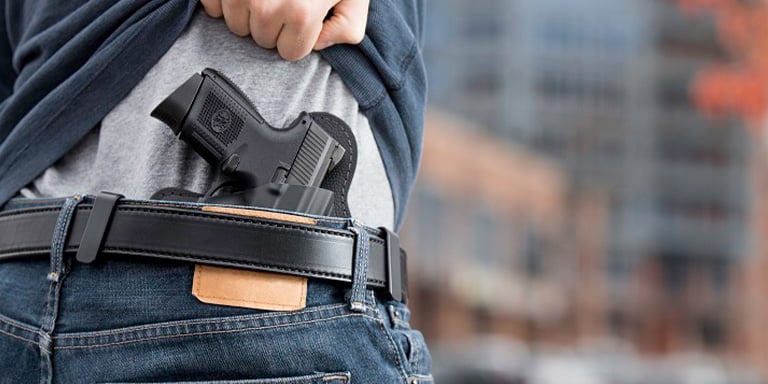

If you've never gone through the process of getting a license or permit to conceal a handgun, it can seem daunting. You might even worry that you'll do something wrong and end up accidentally carrying a weapon illegally. Although these are real concerns, they're often overblown; in most states, the process of getting your CCW (Concealed Carried Weapon) permit is pretty straightforward, as are the rules governing concealed carry.
This guide will walk you through the general process of getting your first CCW, sometimes called a CHL (Concealed Handgun License), CWP (Concealed Weapon Permit), or something similar. It's important to note that each state handles the process differently, so this isn't a universal, step-by-step guide; you'll need to contact your local Department of Public Safety (or its state-level equivalent) to learn your state's exact procedures.
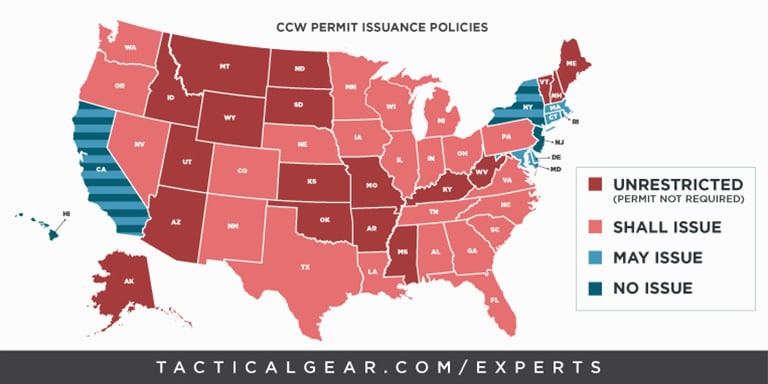
In the United States, there are four levels of legal permissiveness with regard to citizens' ability to carry concealed weapons. All fifty states fall into one of these four paradigms. We reviewed the CCW permissiveness of all 50 states in a more in-depth article, so be sure to give that a read.
Constitutional carry is the least restrictive level of CCW permissiveness. If you can legally own a handgun, you can legally carry and/or conceal it in public (not necessarily both), no permit or license required. In some constitutional carry states, getting a permit may confer minor additional privileges, most notably reciprocity with other states. Currently, the constitutional carry states are Alaska, Arizona, Arkansas, Idaho, Kansas, Kentucky, Maine, Mississippi, Missouri, Montana, New Hampshire, North Dakota, Oklahoma, South Dakota, Utah, Vermont, West Virginia and Wyoming.
Shall-issue states are those in which the governing authority will issue CCW permits to all applicants who meet basic eligibility criteria. The criteria are objective, and the state cannot refuse to issue a permit based on subjective discretions.
Shall-issue states include Alabama, Colorado, Florida, Georgia, Illinois, Indiana, Iowa, Louisiana, Michigan, Minnesota, Nebraska, Nevada, New Mexico, North Carolina, Ohio, Oregon, Pennsylvania, South Carolina, Tennessee, Texas, Virginia, Washington and Wisconsin.
The governing authorities in may-issue states, as the name implies, may or may not issue you a permit to carry a concealed weapon. The exact requirements vary widely by state, but ultimately, one person or group decides to approve or reject each application on a case-by-case basis — and their decisions may not be objective. In practice, "may-issue" states tend to be quite restrictive and it's usually difficult to get a permit unless you can show proof of a specific and ongoing threat to your life or property. The may-issue states consist of California, Connecticut, Delaware, Maryland, Massachusetts, New York and Rhode Island.
If you live in a no-issue state, it's effectively illegal for you to carry or conceal a handgun unless you're a sworn law enforcement officer. Rare and limited exceptions may exist. The no-issue states are Hawaii and New Jersey, plus Washington D.C. Many sources consider these to be "may-issue" states, but in practice, very few concealed carry applications are approved.
It's also important to note that, while widely governed by may-issue policies, many counties in New York and California apply strict, no-issue laws. In New York, the no-issue counties include Genesee, Tompkins, Saratoga, Rockland, Westchester, The Bronx, New York, Richmond, Kings, Queens, Nassau and Suffolk, while California's no-issue counties consist of Marin, San Francisco, San Mateo, Santa Cruz, Santa Clara, Alameda, Santa Barbara, Los Angeles and Imperial.
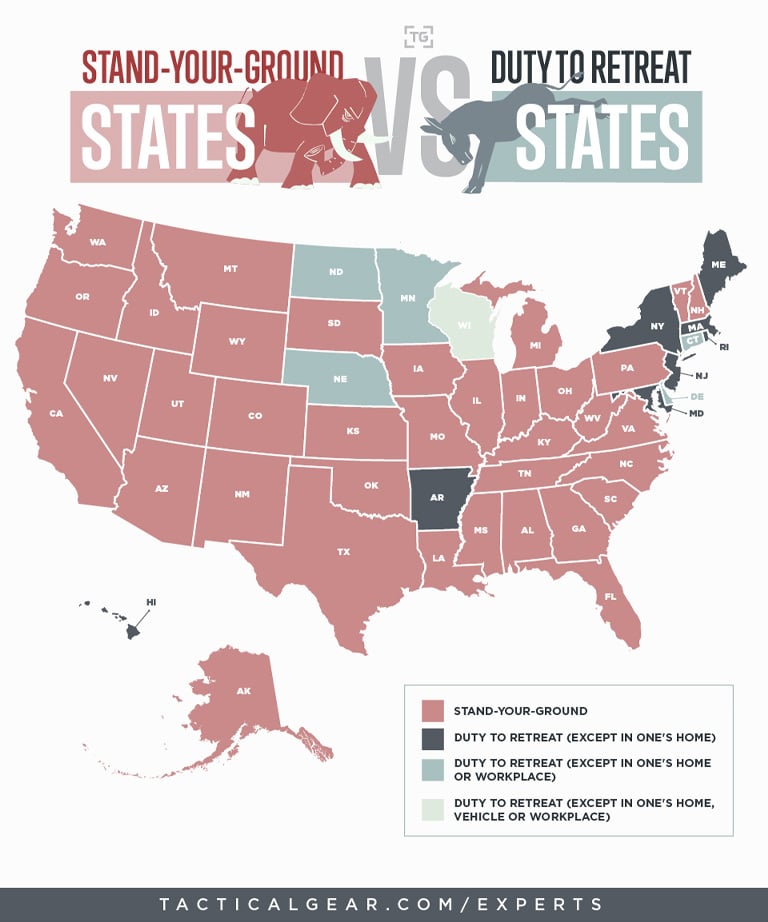
The circumstances under which you're legally permitted to fire a gun in self defense vary from state to state. There are three broad legal standards. Be sure to read our guide on navigating the legal process after using a firearm in self-defense in order to prepare yourself for the unlikely event that you must defend yourself with your weapon.
In these states, you have no duty to retreat from an attacker if you have a reasonable basis for believing that the attacker poses an imminent threat to someone's life.
In your home or business, you have no duty to retreat from an attacker. In other places, you may have a legal duty to retreat. If you live in one of these states, take extra care to get really clear on when and where you're legally permitted to use your weapon in self defense.
In these states, you must attempt to flee from an attacker if you can. You may legally use lethal force only if retreat is unfeasible. For a more in-depth analysis of each state's laws, check out our guide to stand your ground laws.
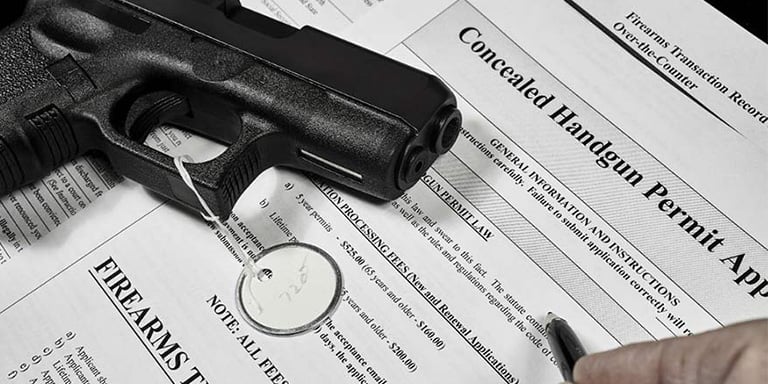
Once you understand your local laws, you're ready to prepare and submit your CCW application. Before you spend too much time going through the process, take a few minutes to ensure that you meet all of your state's basic eligibility criteria.
Some states may impose additional eligibility requirements. These requirements should be clearly described on the issuing authority's website. Alternatively, you can call your local police or sheriff's department and ask to speak with an officer about concealed carry laws and requirements. Most officers will be happy to chat with you for a few minutes to help you ensure that you understand the law. At the very least, they should direct you to a webpage or provide you with a pamphlet.
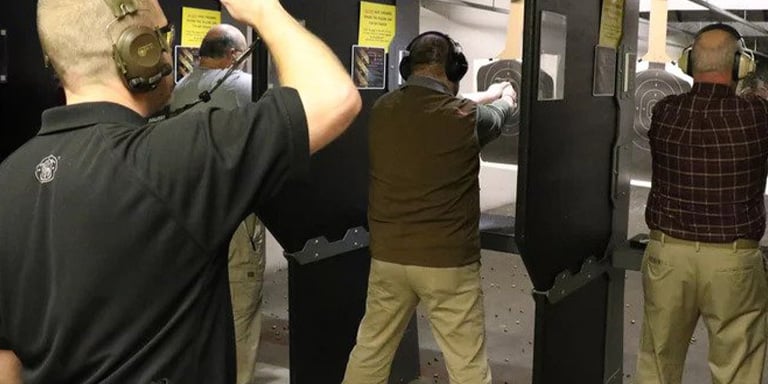
Most states require CCW applicants to take and pass a CCW or firearms safety course prior to applying for a permit. The issuing authority's website should have a directory of all state-approved classes in your area. If you take a class that isn't on the list, your application will likely be rejected.
Most CCW classes last 1 or 2 days and cost about $100. These classes cover basic firearm safety, as well as local concealed carry and use-of-force laws. At the end of the class, you'll be required to demonstrate basic handgun proficiency on the range. If you've never been to a shooting range before, take a look at what to expect on your first day at the range.
To pass the live-fire test, you'll have to show that you can fire with accuracy and control at close range, such as by hitting a human-sized silhouette ten out of ten times at a distance of fifteen feet. The exact requirements will vary, but they should be comparably basic. Some classes provide a firearm and ammunition to use for the test, whereas others require you to bring your own. If you need help deciding which handgun would be best for you, we offer great advice on buying your first handgun.
If you currently possess a valid CCW from another state, or if you've had one in the past, you may be able to skip the class; contact the issuing authority to ask. A few states, such as Arizona, waive the class requirement if you've served in the military and were discharged honorably.
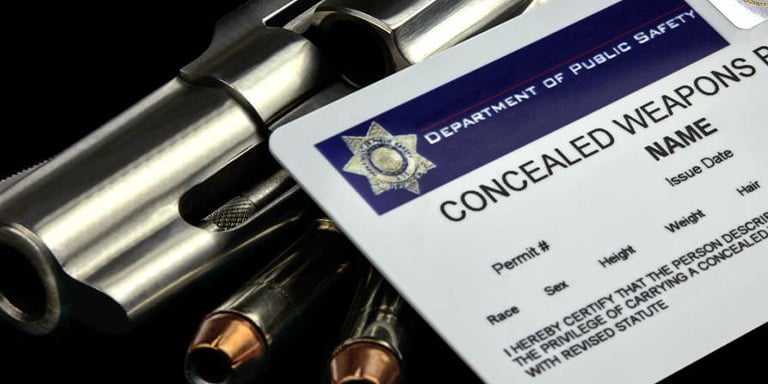
As of this writing, a few states allow you to submit your CCW application entirely online, but most still require a mailed paper application.
Read the instructions carefully, fill out the application, and review it for errors three times. In most states, the slightest mistake or inconsistency will cause your application to be rejected, and you may have to pay another fee to apply again. Submit your application, along with all required documentation and fees. In most cases, the state will take 30 to 90 days to process your application. You can't legally carry/conceal your weapon until you receive your permit.
As long as you conduct some basic preliminary research and pay attention to details on the application, you should have little trouble getting your CCW permit (unless you live in a may-issue or no-issue state). Be sure to put the expiration date on your calendar and renew your permit at least 90 days early to avoid a potentially costly and time-consuming reinstatement process.
Did you find this article helpful?